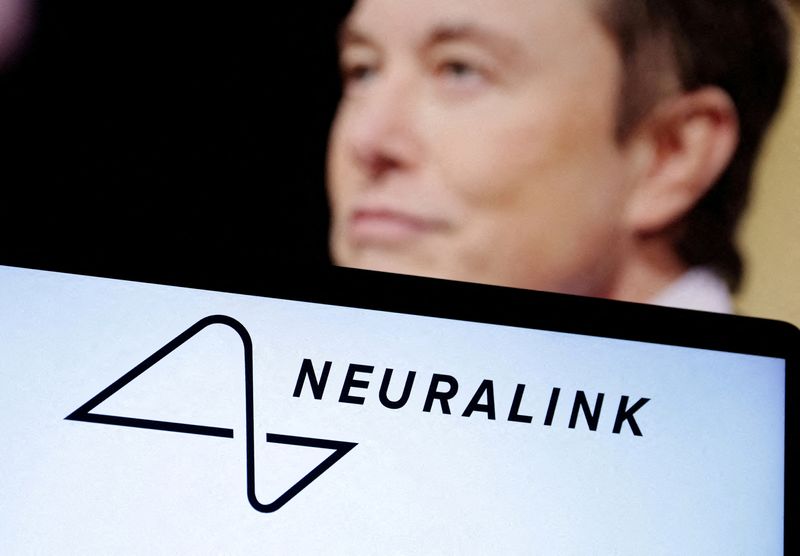By Marisa Taylor
WASHINGTON (Reuters) - U.S. Food and Drug Administration inspectors found problems with record keeping and quality controls for animal experiments at Elon Musk's Neuralink, less than a month after the startup said it was cleared to test its brain implants in humans, according to an agency report reviewed by Reuters.
The inspectors identified quality control lapses at the company's California animal research facility. A similar inspection at Neuralink's Texas facility did not find problems, according to agency records.
Those visits took place last year from June 12-22, and represent the FDA's sole inspections of Neuralink facilities on record. The inspector reports were shared with Reuters by Redica Systems, a data analytics company that obtains FDA compliance reports through open records requests.
"These issues show a lack of attention to detail," said Jerry L. Chapman, a senior quality expert with Redica Systems.
The laboratory problems identified by FDA inspectors included missing calibration records for instruments such as a pH meter used in one of the studies. For another study, seven instruments including a "vital signs monitor" had no record of having been calibrated. Neuralink conducted experiments on hundreds of animals, including monkeys.
Other issues included quality assurance officials not signing off on the final study report or documenting any deviations from approved protocols or standard operating procedures.
"This certainly is a signal that the company needs to be vigilant about certain practices," said Chapman, adding that the company would be required to follow similar practices for its human trials.
The brain implant is being tested to help patients paralyzed by spinal cord injury or amyotrophic lateral sclerosis (ALS), also known as Lou Gehrig's disease, communicate using thoughts to move a computer device.
Reuters reported in December 2022 that U.S. Department of Agriculture (USDA) investigators were probing potential animal-welfare violations at Neuralink following internal staff complaints that its animal testing was being rushed, causing needless suffering and deaths. An animal welfare advocacy group, Physicians Committee for Responsible Medicine, submitted a formal complaint to both USDA and FDA over the alleged breaches.
In July, the USDA said it did not find any violations of its animal research rules beyond a 2019 incident that Neuralink had already reported.
'VIOLATIONS OF FUNDAMENTAL REQUIREMENTS'
The FDA has its own requirements for animal research, known as Good Laboratory Practice, to demonstrate that any scientific data being collected in the development of a drug or medical device is reliable, three regulatory experts told Reuters.
Neuralink cited its animal research data in its FDA request to test the implants in humans. Musk, the company's billionaire founder, announced in May that his device was cleared for human trials, and said last month the first patient had received an implant and was recovering well.
Neuralink did not respond to questions about the FDA visit.
The FDA has not issued its designation indicating the severity of problems found in the inspection, according to the agency's database. While the problems identified are serious, they do not appear to be significant enough to justify the FDA's worst inspection designation, which would prompt action, the experts said.
Carly Pflaum, an FDA spokesperson, said Neuralink "provided sufficient information to support the approval" of its human trial application. The agency routinely conducts such inspections, Pflaum said, after human trial approval and before commercial approval to "assure data integrity and reliability" and compliance with other FDA regulations.
"The FDA will continue to monitor the safety of those enrolled in the study for Neuralink's implant device through required, regular reports," Pflaum said.
Ryan Merkley, director of research advocacy at the animal welfare group PCRM, said the FDA should have inspected Neuralink before human trial approval given concerns raised by his organization months earlier.

Victor Krauthamer, a former long-time FDA official, said the agency had jurisdiction to conduct the inspection before permitting the company to go ahead with its clinical trial, and has done so in other cases.
"It would have made sense for the FDA to have conducted the inspection before human trial approval," said Krauthamer, who once reviewed human-trial requests for brain implants at the agency. "These are violations of fundamental requirements that you don’t want to worry about happening again in the human trial."